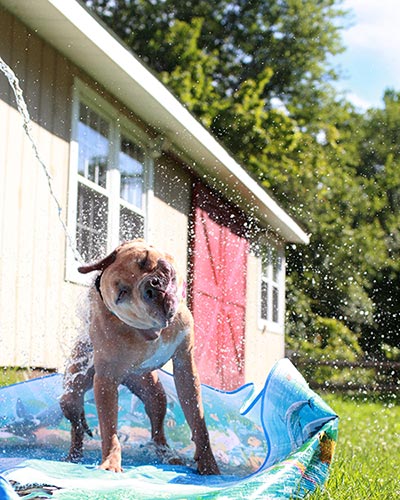Most dogs love the water and will have no problem spending hours at the beach or the lake enjoying fun in the sun & water! But what many dog parents do not realize there is something called water intoxication in dogs – it is real and it could be scary!
Can dogs drink too much water? Many people may not even know that is a question to ask – which is why I wanted to bring awareness to this issue and hope to make a difference for even one dog!
One family in the UK lost their dog Max – who took in too much water after a day at the lake and have been trying hard to spread the word to prevent others from having this happen. Their dog was happy, healthy and young – but simply collapsed after a day at the lake playing fetch in the water which they had done many times before.
What is Water Intoxication?
As devoted pet owners, it’s only natural to have our dogs beside us as we walk along the beach, swim in our backyards or enjoy the refreshing feeling of water on a hot day. But as the saying goes, this can also be too much of a good thing, so much so that it can result in unfortunate and unforeseen fatalities.
Water intoxication in dogs is real and calls for an increase in awareness among pet owners. Read on to learn what water intoxication is and how to protect your dog.
Water intoxication can be knows known as ‘hyponatremia‘ or ‘hypernatremia‘.
- Hyponatremia is when too much fluid in the body causes the sodium level to drop. This is typically fresh water like hoses and pools.
- Hypernatremia is the opposite and is usually from spending too much time in lakes or the ocean and the body loses too much water and the result is a much higher sodium level.
It occurs when a dog consumes more water than it is able to process, resulting in a significant electrolyte imbalance which can result in fatalities. As the body takes in excess water, sodium levels drop or rise in the cells which can greatly impact the nerves, cells and brain.
Why It Is Often Overlooked
As dog owners, it can be rather easy to overlook the danger of water intoxication. After all, most dogs spend a large amount of time playing with their human counterparts in lakes, rivers and backyard pools, especially during the warmer seasons.
The false sense of security of what would be ordinarily considered everyday activities for dogs is why this topic is usually unknown and under-discussed. However, learning the signs and symptoms of water intoxication in your dog may just save his or her life one day!
The Signs of Water Intoxication In Dogs
Because every dog is different they will display water intoxications symptoms differently.
Below are some of the most common signs dogs will show if their bodies have taken in too much water. Your dog may show just one or several of these signs – so stay alert!

● Nausea
● Vomiting
● Bloating
● Difficulty breathing
● Lack of coordination
● Dilated pupils
● Glazed eyes
● Lack of energy or response to stimuli
● Excessive salivation
● Lighter/white coloring of the gums
● An inability to walk/stand
● Collapsing
● Seizures
● Loss of consciousness
While there are quite a few signs and symptoms listed here, if your dog has been around water for a good part of a day and exhibits one or more of these signs, you need to apply caution and get your pup to the vet as soon as possible to avoid any fatalities!
Some may mistake these signs as something else and simply give their dog pain relief meds thinking they are just hurt or in pain. It is important to think about the last 24 hours – the activities your pets have done – this will help you determine if your pet is just in pain or if it is affects of too much water intake!
Which Dogs Breeds Are More Prone to Water Intoxication?
While water intoxication isn’t specific to any particular dog, there are naturally those dogs that will be more at risk. Dogs that are smaller with less body fat and are more athletic are typically more at risk since their bodies cannot absorb water as well.
Agility dogs are a great example as well since these dogs are trained and muscular so their bodies are used to working hard and even if they take on too much water – they may not show signs. Dogs that are obsessive about chasing balls or sticks and will do it over and over again are also at higher risk.
As parents – it is our job to keep them safe, so no matter how much fun your dog seems to be having it is important to limit their time in the water so they can stay safe and healthy.
Dogs that are bred for water sports like Retrievers and Newfoundlands are a smaller risk because they were bred for water activities and are better at navigating water with their mouths closed to keep them protected from ingesting water.
Activities That Can Lead To Water Intoxication
Dogs that enjoy spending time in water are naturally at a much higher risk. Repetitive activities such as retrieving sticks and toys from water can result in your dog ingesting a large quantity of water over a period of time which adds up pretty quickly.
Other backyards activities such as catching or biting at the water from a garden hose or sprinkler also need to be considered carefully.
Although perhaps less likely, dogs can also experience water intoxication if they drink too frequently from their water bowls as a result of having exercised in the heat. If you notice their water bowl has been depleted quickly, wait a while before you refill it which will allow them time to process the water ingested.
Smaller water bowls, filled more frequently through the day are a safer option to large bowls that can be potentially ingested at once.
If your dog is excessively drinking you should take them to the veterinarian to have them tested for other issues that would cause them to drink more! My dog was an excessive drinker after being diagnosed with Cushing’s – drinking too much water in the home can definitely signal other illnesses.
Misdiagnosis
If your dog is not acting normal and is displaying some of the signs listed above – you should definitely take them to the vet! In an effort to prevent misdiagnosis by your veterinarian, make it clear that your dog has spent time in the water and that you would like them checked for water intoxication!
There have been cases of dogs being misdiagnosed because this is so rare and the veterinarian did not account for this is a potential cause of illness as shown in this story.
Treatments For Water Intoxication
Treatments for water intoxication would be to administer levels of electrolytes to help balance the sodium in their system.
There are also diuretics to help your dog urinate faster and other drugs to help reduce the swelling in the brain if that has started happening as well. Sadly, many dogs are too far along to be helped and some that are saved can wind up with some level of brain damage.
Prevention
Below are simple steps and recommendations to help keep your pet safe but still allowing them the chance to enjoy all the fun that water brings
- Limit swim time to 5 or 10 minutes, then take a long break. Repeat!
- Do not use balls for fetch but flat objects, the less open your dogs mouth needs to be the better since they will ingest less water.
- Notice your dogs swim style! If they swim with nose and mouth shut, they are less at risk. If your dog is a splasher with their mouth open and nose down – giving them less swim time is important!
- Do not let your dog bite water from a hose! That water is going right into their system.
Final Thoughts
Water intoxication can be a silent killer but luckily can just as easily be avoided if you are vigilant with how much water exposure your dog is getting on any given day.
As much as we as pet owners focus on ensuring that our pets have sufficient access to clean drinking water and water adventures, we also have to educate ourselves of the risks associated with hyper-hydration!

